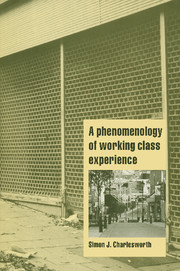Book contents
- Frontmatter
- Contents
- Acknowledgements
- 1 Introduction: Dead Man's Town
- 2 Rotherham: history, demography and place
- 3 Class and the objectifying subject: a reflexive sociology of class experience
- 4 A landscape with figures?
- 5 Understanding the barriers to articulation
- 6 Necessity and being working class
- 7 The culture of necessity and working class speech
- 8 Conclusion
- Notes
- References
- Index
6 - Necessity and being working class
Published online by Cambridge University Press: 22 September 2009
- Frontmatter
- Contents
- Acknowledgements
- 1 Introduction: Dead Man's Town
- 2 Rotherham: history, demography and place
- 3 Class and the objectifying subject: a reflexive sociology of class experience
- 4 A landscape with figures?
- 5 Understanding the barriers to articulation
- 6 Necessity and being working class
- 7 The culture of necessity and working class speech
- 8 Conclusion
- Notes
- References
- Index
Summary
There is a terrible beauty in some of these girls – terrible, I mean, because it is ephemeral, foredoomed. The language that our children speak may not be standard English but there still is wisdom here. Our children have become wise by necessity.
(Kozol 1992: 34)And dimly she realized one of the great laws of the human soul: that when the emotional soul receives a wounding shock, which does not kill the body, the soul seems to recover as the body recovers. But this is only appearance. It is really only the mechanism of the re-assumed habit. Slowly, slowly the wound to the soul begins to make itself felt, like a bruise, which only slowly deepens its terrible ache, till it fills all the psyche. And when we think we have recovered and forgotten, it is then that the terrible after-effects have to be encountered at their worst.
(Lawrence 1994a: 49)Living in Rotherham, one cannot help but be struck by an underlying coherence in the life of the place; a collective experience; a distinct sense that seems to recur throughout conversations, an emergent theme. Moreover, as one encounters life in this way, it soon becomes clear that much everyday expression is rooted in people's experience of insecurity and an inability to secure for themselves the things they need in order to live.
- Type
- Chapter
- Information
- A Phenomenology of Working-Class Experience , pp. 150 - 202Publisher: Cambridge University PressPrint publication year: 1999

